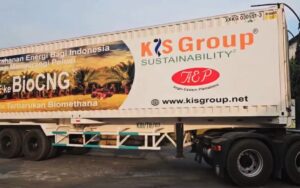Unilever has begun using biomethane derived from palm oil waste to reduce greenhouse gas emissions at its largest facility in Indonesia, marking the country’s first commercial biomethane offtake.
The initiative focuses on Unilever Oleochemical Indonesia (UOI) in Sei Mangkei, North Sumatra, which became the company’s largest global greenhouse gas-emitting site following a recent expansion.
By replacing fossil-based natural gas with biomethane produced from palm oil mill effluent (POME), Unilever aims to reduce its Scope 1 and 2 emissions and support Indonesia’s renewable energy transition.
In partnership with biogas provider KIS Group, biomethane is sourced from nearby mills within Unilever’s sustainable palm oil programme.
KIS captures methane from POME, purifies and compresses it, and transports it to UOI using trucks powered by the same bioCNG.
Any leftover solids are repurposed as organic fertiliser for local plantations.
The company plans to expand sourcing to a total of nine mills over the next two years, targeting over 800,000 MMBtu per year - almost a quarter of UOI’s energy requirements by 2030.
“Expanding operations sustainably is a priority,” said Saikrishna Devarakonda, Managing Director of UOI. “Partnering with KIS allows us to cost-effectively reduce emissions while continuing to grow.”
The initiative not only cuts emissions but also helps Indonesia reduce reliance on imported energy.
Estimates suggest that the country’s palm oil mill effluent could produce enough biomethane to meet more than 5% of its natural gas demand in 2024.
By capturing methane that would otherwise be released into the atmosphere, Unilever is tackling a potent greenhouse gas while promoting renewable energy adoption in the palm oil sector.
KR Raghunath, founder and CEO of KIS, added: “Unilever Indonesia achieves decarbonisation, and the country becomes more independent of energy imports. This model demonstrates multiple benefits for business and the environment.”
Unilever’s programme is part of its global strategy to leverage biomethane and sustainably sourced biomass to meet its 2030 climate targets and encourage broader change in industrial energy use across Indonesia.
Unilever turns palm oil waste into biomethane to cut emissions in Indonesia

















